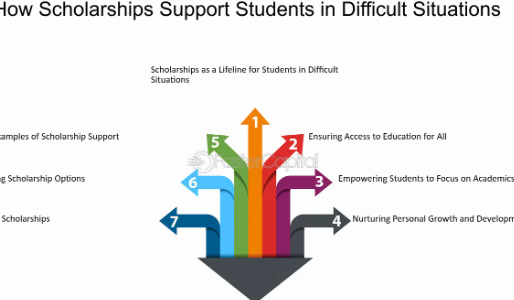The Ultimate Scholarship Search: Finding Funds for Higher Education

process: Start Early: Begin your scholarship search as early as possible, preferably in your junior year of high school or even earlier. Many scholarships have early application deadlines, so the sooner you start, the better your chances of finding suitable opportunities. Use Online Scholarship Search Engines: There are several websites and online databases dedicated to helping students find scholarships. Some popular options include: Fastweb Scholarships.com CollegeBoard’s Scholarship Search Cappex Chegg Scholarships Peterson’s Unigo These platforms allow you to create a profile and match you with scholarships that fit your qualifications and interests. Check with Your School: Your
high school’s guidance counselor or college advisor can provide valuable information about local and national scholarships. They may also have access to scholarship databases and resources that can aid in your search. Explore Scholarships Based on Your Background and Interests: Many scholarships are available for specific groups of students, such as minorities, first-generation college students, students pursuing certain fields of study (STEM, arts, humanities, etc.), athletes, LGBTQ+ students, veterans, and more. Research scholarships that cater to your unique background, experiences, and interests. Review College Financial Aid Websites: Once you’ve narrowed down your
list of prospective colleges, visit their financial aid websites to explore scholarship opportunities specific to those institutions. Colleges often offer merit-based scholarships, need-based grants, and other forms of financial aid to incoming students. Search for Local Scholarships: Don’t overlook scholarships offered by community organizations, businesses, religious groups, and local foundations. These scholarships may have less competition than national awards and could be tailored to students from your area. Read Eligibility Criteria Carefully: Pay close attention to the eligibility requirements for each scholarship you consider. Make sure you meet all the criteria before applying to
avoid wasting time on scholarships for which you’re not eligible. Prepare a Strong Application Package: Most scholarship applications require various components, such as essays, letters of recommendation, transcripts, resumes, and financial aid forms. Take the time to craft compelling essays and gather supporting documents that showcase your achievements, goals, and financial need. Stay Organized: Keep track of scholarship deadlines, requirements, and submission instructions using a spreadsheet or planner. Missing deadlines could mean missing out on valuable funding opportunities. Apply to as Many Scholarships as Possible: Cast a wide net and apply to as many scholarships as you can realistically handle. Remember that every scholarship you receive, no matter how
small, contributes to reducing your overall college expenses. Follow Up: After submitting your applications, follow up with scholarship providers if you haven’t heard back within a reasonable timeframe. Express gratitude for the opportunity to apply and inquire about the status of your application. Beware of Scholarship Scams: Be cautious of scholarship offers that require upfront fees or guarantee success. Legitimate scholarships do not require payment to apply, and no organization can guarantee that you’ll win a scholarship. By leveraging these strategies and resources,
you can maximize your chances of finding scholarships to fund your higher education and alleviate the financial burden of college tuition. Remember to stay proactive, persistent, and organized throughout the scholarship search process.Starting your scholarship search early is crucial for maximizing your opportunities and increasing your chances of securing funding for higher education. Here are some specific steps you can take to kickstart your search early: Research Scholarship Deadlines: Begin by compiling a list of scholarships you’re interested in and note their application deadlines. Some scholarships have early deadlines, while others may accept applications on a rolling
basis. Mark these deadlines on your calendar or set reminders to ensure you don’t miss any opportunities. Create a Scholarship Calendar: Organize your scholarship deadlines into a calendar or spreadsheet, including key information such as the name of the scholarship, deadline, eligibility criteria, and application requirements. Having a visual overview of your deadlines will help you stay on track and prioritize your efforts. Gather Required Documents: Many scholarships require supporting documents such as transcripts, letters of recommendation, essays, and financial aid forms. Start gathering these documents early to avoid last-minute scrambling. Request letters of recommendation from teachers, mentors, or employers well in advance to give them ample time to write quality letters. Develop a
Scholarship Essay Template: Many scholarship applications require essays on topics such as your academic goals, extracurricular activities, community involvement, or personal experiences. Develop a generic essay template that you can customize for different scholarships, saving time while still crafting compelling essays tailored to each application’s requirements. Build Your Resume: Create a comprehensive resume highlighting your academic achievements, extracurricular activities, volunteer work, leadership roles, part-time jobs, internships, and any other
relevant experiences. Keep your resume updated as you progress through high school or college, adding new accomplishments and experiences along the way. Research Potential Colleges: Research colleges and universities that align with your academic interests, career goals, and financial considerations. Explore their scholarship offerings, merit-based aid, need-based aid, and other forms of financial assistance available to incoming students. Understanding your prospective colleges’ financial aid policies can help you plan your scholarship strategy accordingly. Participate in Enrichment Activities: Engage in extracurricular activities, leadership roles, internships,
community service projects, and other enrichment opportunities that not only enrich your high school experience but also strengthen your scholarship applications. Scholarship committees often look for well-rounded applicants who demonstrate a commitment to academics, leadership, and service. Attend Scholarship Workshops and Information Sessions: Take advantage of scholarship workshops, information sessions, and financial aid seminars offered by your high school, local community organizations, or colleges. These events provide valuable guidance on
finding and applying for scholarships, understanding financial aid options, and navigating the college admissions process. By starting your scholarship search early and taking proactive steps to prepare your application materials, you’ll position yourself as a competitive candidate for scholarships and increase your chances of securing funding for your higher education journey.




